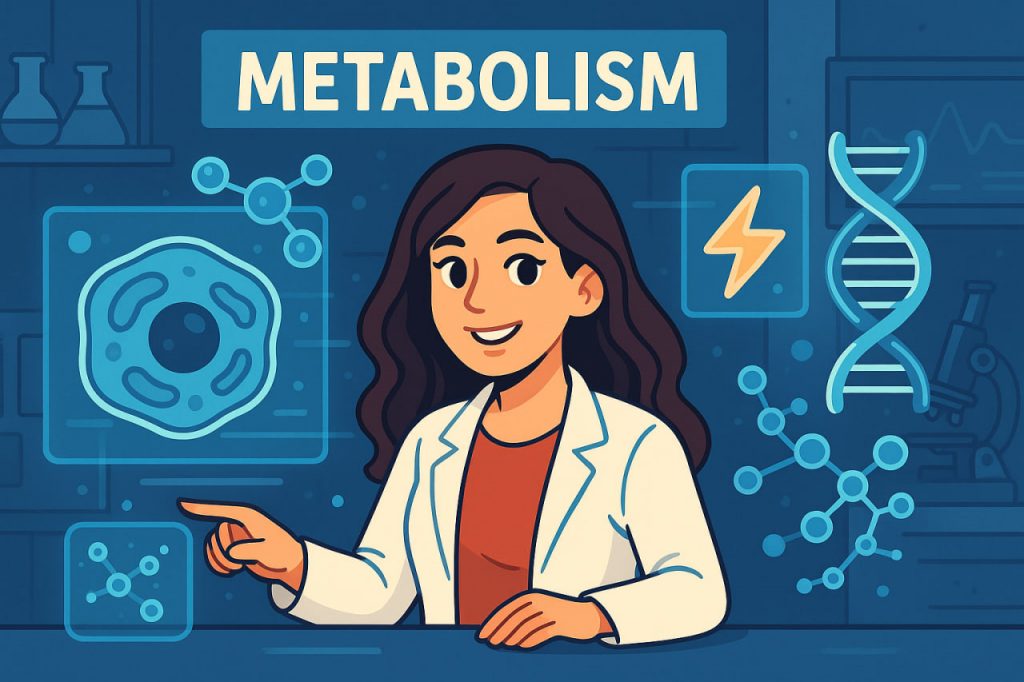Every living organism depends on a complex and dynamic process called metabolism, the invisible engine that fuels life itself. From breathing and digesting food to thinking and moving, metabolism is at work every second of every day. It transforms the nutrients we consume into energy, builds the structures that sustain our bodies, and disposes of waste to maintain internal balance. Understanding metabolism is key to grasping how the human body functions — and why energy, diet, and health are so deeply interconnected.
What Is Metabolism?
Metabolism is the sum of all chemical reactions that occur in the body to maintain life. These reactions fall into two main categories: catabolism, which breaks down molecules to release energy, and anabolism, which uses that energy to build and repair tissues. The energy released during catabolism, mostly in the form of adenosine triphosphate (ATP), powers every cellular function, from heartbeat to cell division. Together, these processes ensure that the body can adapt to constant changes — whether it’s digesting a meal, healing an injury, or adjusting to temperature shifts.
The Role of Energy in Metabolism
Energy is the currency of life, and metabolism is the economy that manages it. The body derives this energy primarily from carbohydrates, fats, and proteins. Through digestion and absorption, these macronutrients are broken down into glucose, fatty acids, and amino acids, which cells then convert into ATP. The mitochondria, often called the “powerhouses of the cell,” play a crucial role in this conversion process through a sequence of reactions known as cellular respiration. Scientists emphasize that metabolism is not simply about burning calories — it’s about sustaining the delicate energy balance that allows organisms to survive and thrive.
Factors That Influence Metabolic Rate
The metabolic rate — the speed at which the body converts energy — varies among individuals and is influenced by many factors. Genetics play a major role, as does body composition: muscle tissue burns more energy than fat, even at rest. Age, sex, and hormonal activity also affect how quickly the body metabolizes nutrients. For instance, thyroid hormones regulate energy use, while insulin controls glucose metabolism. Environmental conditions, such as temperature, and lifestyle choices, like sleep, stress, and diet, can further speed up or slow down metabolic processes. Contrary to popular belief, metabolism rarely “shuts down” completely; rather, it adapts continuously to match the body’s needs.
How Metabolism Connects to Health and Weight
Metabolism is closely tied to body weight, but the relationship is more complex than many assume. While a faster metabolism burns more energy and may help prevent fat storage, weight gain or loss primarily depends on the balance between calories consumed and calories expended. However, metabolic efficiency — how well the body converts food into usable energy — also matters. Disorders such as hypothyroidism, metabolic syndrome, and type 2 diabetes disrupt normal metabolism, leading to energy imbalance and health issues. Experts like Dr. Michael Mosley emphasize that maintaining metabolic health involves more than dieting: it requires regular movement, balanced nutrition, and proper sleep.
The Science of Cellular Metabolism
At the cellular level, metabolism is an intricate network of biochemical pathways. One of the most essential is the Krebs cycle (or citric acid cycle), which breaks down nutrients into energy molecules. The electron transport chain, another vital component, uses oxygen to produce ATP efficiently. These reactions depend on enzymes, specialized proteins that act as catalysts to speed up chemical processes without being consumed. Cellular metabolism is highly regulated, ensuring that the body produces enough energy for immediate needs while storing the rest for later use. When metabolism malfunctions, it can lead to conditions like fatigue, insulin resistance, or even cancer.
Expert Perspectives on Metabolic Research
According to biochemist Dr. Bruce Spiegelman of Harvard Medical School, “Metabolism is not just about energy — it’s the foundation of life’s adaptability.” His research into brown fat, a type of tissue that burns calories to produce heat, has reshaped our understanding of energy balance. Meanwhile, endocrinologist Dr. Sandra Aamodt points out that “the brain plays a powerful role in regulating metabolism — it decides when to eat, burn, or store energy.” These insights reveal that metabolism is not just a biological process but a dynamic system intertwined with behavior, environment, and evolution.
The Future of Metabolic Science
As scientists continue to study metabolism, they are uncovering links between energy regulation, aging, and disease. New research focuses on metabolic flexibility — the body’s ability to switch between burning carbohydrates and fats — as a key factor in long-term health. Advances in nutrigenomics, the study of how genes interact with nutrients, may one day allow personalized diets that optimize metabolism for each individual. At the same time, medical innovations are targeting metabolic disorders with precision therapies that restore balance rather than simply reduce symptoms.
Interesting Facts
- About 60–75% of daily energy expenditure comes from the basal metabolic rate, the energy needed to maintain vital functions at rest.
- The liver is one of the most metabolically active organs, accounting for nearly 20% of total energy use.
- Cold temperatures can temporarily boost metabolism by stimulating brown fat activity.
- Muscle tissue burns roughly three times more calories than fat tissue, even when the body is at rest.
- During sleep, metabolism slows only slightly — your body still uses energy to repair cells and regulate hormones.
Glossary
- Metabolism – The total of all chemical reactions in the body that maintain life.
- Catabolism – The breakdown of molecules to release energy.
- Anabolism – The synthesis of complex molecules for growth and repair.
- ATP (Adenosine Triphosphate) – The main energy-carrying molecule in cells.
- Mitochondria – Organelles that produce energy through cellular respiration.
- Krebs Cycle – A series of chemical reactions that generate energy from nutrients.
- Enzyme – A protein that accelerates biochemical reactions in the body.
- Thyroid Hormone – A hormone that regulates metabolic rate and energy balance.
- Metabolic Syndrome – A cluster of conditions that increase the risk of heart disease and diabetes.
- Nutrigenomics – The study of how diet interacts with genes to influence health and metabolism.


